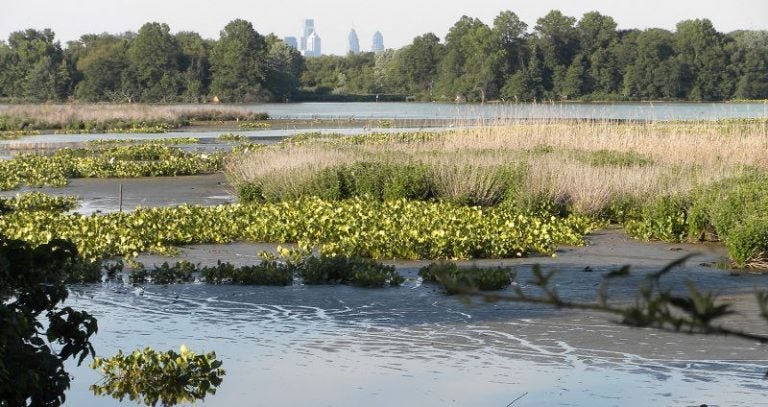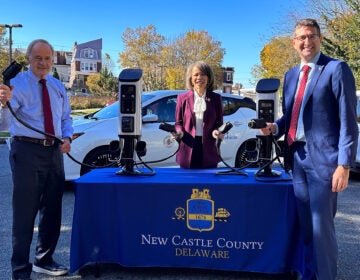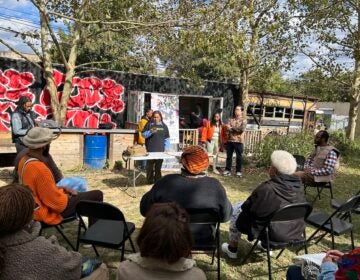Philadelphia needs to invest in green space to combat climate change, support communities
City Councilmember Gilmore Richardson argues investment in green space is critical to fight climate change — and can help create jobs and reduce violence.

Philadelphia's downtown skyline is visible above the Eastwick tree line. (Eastwick Friends & Neighbors Coalition)
The impacts of Tropical Storm Isaias were felt all across Philadelphia in early August.
The Schuylkill River saw one of the highest surges on record and residents of Eastwick and Manayunk who were forced to evacuate are still struggling to recover. Rivers, streams and creeks across the city burst with flooding and filled with debris, stormwater, and wastewater pollution from the city’s aging combined sewer system.
In the midst of multiple intersecting crises of a global pandemic, economic recession, structural racial inequality, and gun violence, Philadelphia is faced with another crisis: climate change. As City Council addresses our post-COVID-19 reality, the impacts of climate change and its disproportionate adverse effects on disadvantaged communities must be central.
The Philadelphia Water Department is currently implementing the city’s Green City, Clean Waters plan to reduce the amount of overflow events such as the one after Isaias. The plan relies on an innovative nature-based approach known as “green stormwater infrastructure,” like the rain gardens and tree trenches popping up across the city, including in Strawberry Mansion. While Green City, Clean Waters is not a flood mitigation plan, GSI can play an important role in helping us build a climate-resilient city.
While Philadelphia has been a leader in GSI, as climate change worsens, we will see bigger storms and need more investment in order to create safe and resilient communities. Climate scientists predict that area waters could rise 19 inches by 2050, and 4 feet or more by 2100. Climate change disproportionately impacts low-income communities and communities of color, evidenced by how the predominantly Black neighborhoods in Eastwick and Germantown are already experiencing flooding during heavy rain storms.

Subscribe to PlanPhilly
GSI also has multiple co-benefits: It’s not only an infrastructure investment, but also an investment in Philadelphia’s neighborhoods. For example, parts of North, South, and West Philadelphia suffer from what’s known as an Urban Heat Island effect, where the temperatures are sometimes as much as 22 degrees hotter than other parts of the city. The result is an increase in heat related illness and death. Studies have shown that access to green space increases the quality of life for the surrounding communities and reduces the impacts of the Urban Heat Island effect. In an era of COVID-19, communities are seeking more green space to safely cool off, socialize and recreate, which well-designed GSI can provide.
Economic opportunities also play an important role in gun violence prevention, and green industries are creating good jobs right here in Philadelphia. The city’s green infrastructure improvements have created a strong local industry, and studies show that access to green space can help reduce crime in urban environments. Programs like PowerCorpsPHL and PHS’s Roots to Re-entry program are training youth and adults with history in the criminal justice system in land care professions.
As chair of City Council’s committee on the environment, I have called on environmental experts and advocates, like PennFuture, to work with me to develop legislative solutions to address these challenges. Part of this work is evaluating the successes we’ve already had, like with Green City, Clean Waters, as well as what solutions we still need to implement to mitigate the impacts of climate change. Our seven Civilian Environmental Advisory groups focus on issues of air quality, energy, green jobs and businesses, green space, transportation, waste, and water. Each group is tasked with centering their solutions around environmental justice.
The COVID-19 pandemic has left the city, and the nation, in a state of crises and massive unemployment. City leaders will be tasked over the next several months with determining a path forward out of the pandemic. By continuing to support and invest in GSI — and reinvesting in the city’s communities and nature-based infrastructure to form sustainable economies — we can create a Philadelphia that is equitable, safe, healthy, and resilient for all.
Katherine Gilmore Richardson is a Philadelphia councilmember at-large and the chair of the committee on the environment. Lena Smith is the campaign manager for Clean Water Advocacy at PennFuture.
WHYY is your source for fact-based, in-depth journalism and information. As a nonprofit organization, we rely on financial support from readers like you. Please give today.







